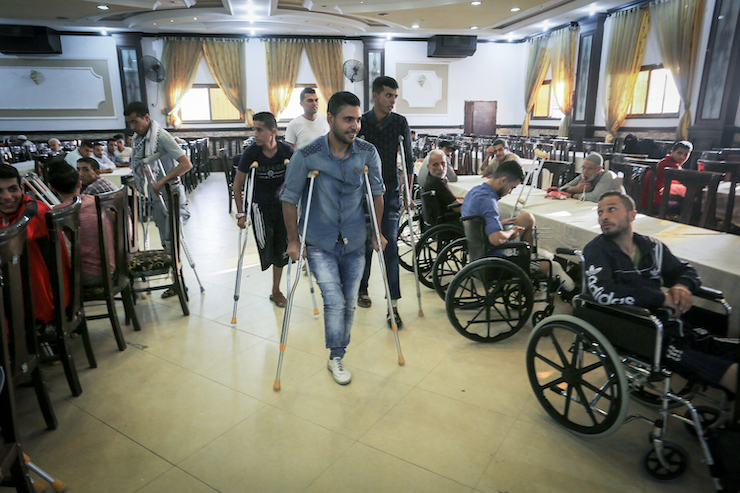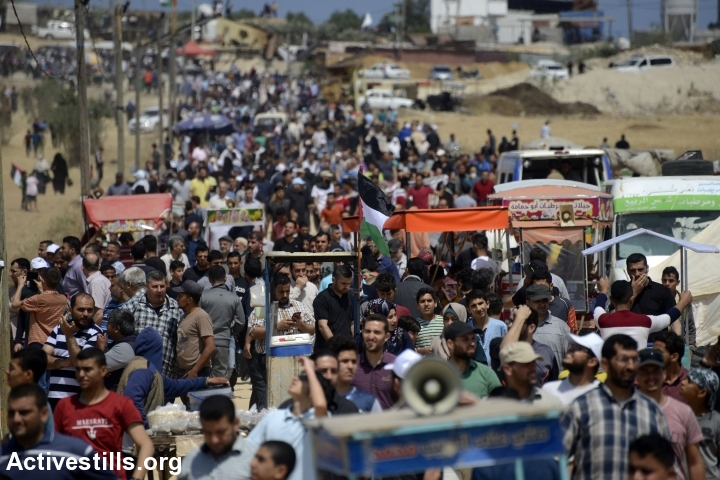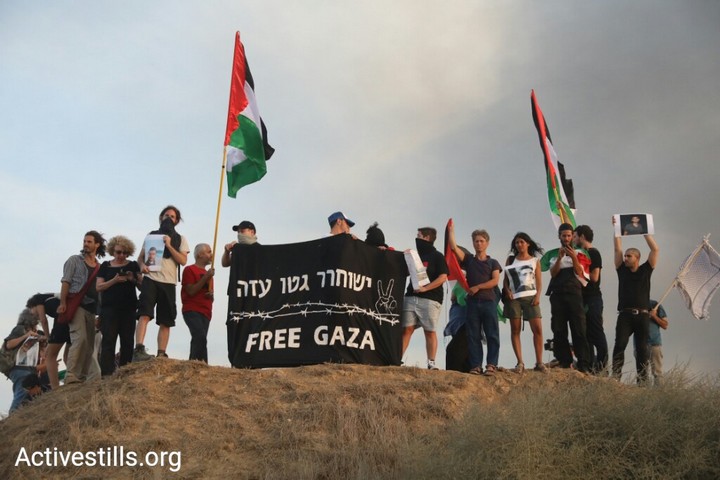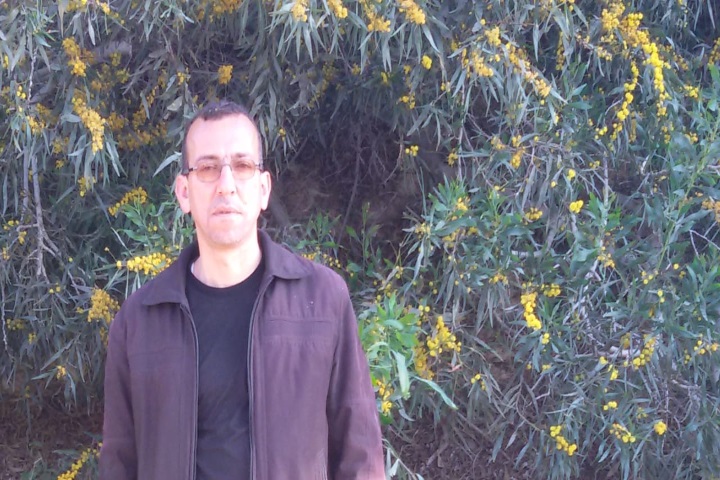Everywhere You Go in Gaza, You See People Wounded in the Return March
PALESTINE - ISRAEL, 1 Apr 2019
Hasan al-Kurd, one of the organizers of last year’s Great March of Return in Gaza, says the protests gave people in Gaza a reason to live. In a frank interview, he talks about the shocking number of casualties, how Hamas took over the nonviolent initiative, and what he would do differently today.

Young Palestinian men who lost their legs after being shot by Israeli snipers in the Great Return March attend an Iftar dinner organized by a charity in Khan Younis, Gaza Strip, June 11, 2018.
(Abed Rahim Khatib/Flash90)
28 Mar 2019 – “This is kind of like our anniversary,” I say to Hasan al-Kurd, one of the organizers of the Great March of Return in Gaza. “It is,” al-Kurd chuckles, “I never expected that we’d still be going for a full year.”
The first time Hasan and I spoke was on the eve of the Great March of Return,. Al-Kurd had wanted to send a message of peace to Israelis. A year later, despite admitting that things turned violent far quicker the organizers expected, he says he still believes in nonviolence.
The optimism that came through the phone line in that first interview was replaced this time by a sense of depression. According to figures released by the United Nations this week, since the protests began last March 30th, Israeli forces have shot and killed 195 participants, including 41 children. More than 29,000 protesters were injured or wounded, more than half of them by Israeli gunfire. Some estimate even higher numbers.
Al-Kurd says he didn’t think it the casualty figures would get so high.
“I thought we would hold the march for a month or two. That they’re still going is nothing short of astonishing,” he says. “It only goes to prove that we can continue this struggle forever, and I say that despite the fact that one of our only accomplishments is that we gave people in Gaza a reason to live.”
On Saturday, March 30, when Palestinians mark Land Day and a year since the protestsbegan, demonstrators are expected to come back in large numbers. Al-Kurd and the other original organizers openly admit that Hamas is calling the shots today. That bothers them.
Over the course of our interview, al-Kurd expresses his concerns about high numbers of Palestinian casualties. On the opening day of the protests last year, Israeli troops killed 14 Palestinians. A month and a half later, on May 14, Israeli snipers killed 68 protesters. According to the original plan, the Great March of Return was supposed to be a family friendly series of events, nonviolent, and staying hundreds of meters away from the fortified fence.
“You see the injured everywhere in Gaza,” al-Kurd says.
“My family is among the wounded,” he continues. “I can’t walk down the street anymore without people blaming or complaining to me. It’s not the wounded people who complain, those whose lives were destroyed — it’s those around them who are the saddest and most frustrated.”
“We understand them and we know it’s not personal,” al-Kurd says of himself and the other original organizers. “For every martyr, you see hundreds of wounded, and the wounded don’t fully recover because of the type of weapons Israel used against us.”
“I told you a year ago that we don’t have a reason to live in Gaza, and aside from the return march, most people here still don’t have a reason to live,” he adds. “On the other hand, people are very supportive — they understand that the occupation is a crime.”
Do you feel like Gazans still support your original idea?
“You tell me. A year later, despite the war crimes Israel committed, people still want to protest. That’s the level of despair we’ve reached in Gaza. The return march is the most talked-about thing in Gaza.”
Despite the fact that Hamas took over?
“It’s not that Hamas took over — Hamas controls everything in Gaza. What they want to happen happens, and what they don’t want to happen doesn’t happen. The tents, the buses, the infrastructure to stage the protests, and the financial support comes from them because we, as independent activists, weren’t able to do it alone. But the protesters weren’t necessarily Hamas supporters.”
“That Hamas is leading the protests is disturbing but it also makes things easier. It’s disturbing because we lost control over our original idea. On the other hand, even in our original idea it was reasonable to assume that the occupation would massacre us, perhaps with fewer casualties, but they still would have struck us. At least this way you know that there’s a large organization that is taking care of the wounded and the families of those killed, and which takes responsibility. But despite that, the fact that Hamas is the face of this protest weakens the message that we’re trying to send to the world.”
Do you see a connection between the protests along the fence, against Israel and the blockade, and the protests against Hamas that took place last week?
“Yes. A pack of cigarettes costs 20 shekels here. For you that’s nothing but for some of us that’s a day’s wages — and that’s if you even have a job. Fatah tried to exploit a legitimate protest against Hamas and take the reins, which gave Hamas an excuse to escalate its campaign against those protesting against it. As I said, the protesters at the fence aren’t necessarily Hamas supporters. These despondent people took the idea of the protests that we started and they turned it against Hamas. The return march didn’t achieve anything tangible and people understand that Hamas wrested control of them. So what happened? People turned their anger toward Hamas.”
“I’ll tell you something else. There’s a connection between the protests against Hamas and the rockets that fell in Tel Aviv. I say that with absolute certainty. I told my friends after I saw the protests against Hamas and after I saw how Hamas suppressed them, that they’re going to redirect the crisis toward the occupation. Resisting the occupation has always been a unifying factor among Palestinian factions. I remember it from my days in the PFLP — if there was a problem with Fatah we would resolve it by acting together against the occupation. Indeed, [the occupation] is the main reason for our problems and that’s also true for Gaza.”
I steer our conversation back to the protests last year and ask al-Kurd whether in retrospect he would do anything differently.
“My original plan was to protest a kilometer and a half from the fence and to approach it very slowly. We really wanted to throw a carnival for the whole family,” he says, recalling a conversation we had at the time. “Some of that actually happened toward the beginning. But the other Palestinian factions, including Hamas, ridiculed us — and me personally — and thought that we needed to approach the fence from the beginning. And look at what happened. In retrospect, I should have insisted on that point. If we had done what we wanted, we could have gotten headlines not only about the blockade but also the return of refugees. [What happened] isn’t what we wanted.”

Thousands of Palestinians march toward the the Gaza-Israel fence during a Great Return March demonstration east of Gaza City, May 14, 2018. (Mohammad Zaanoun)
Al-Kurd’s frankness is heartbreaking. The march’s original organizers were a group of around 20 activists, most of whom were leftists. Only two of the group were affiliated with Hamas, and even they weren’t involved in the armed struggle; they were just political supporters of the movement. Al-Kurd, a school teacher who lives in central Gaza with his wife and six children, had a tough year.
“My whole life is about the march these days,” he says. “It impacts my whole family.”
I mention to al-Kurd that Palestinians in the West Bank didn’t really throw their support behind the protests in Gaza. Last June, the Palestinian Authority violently suppressed protests in Ramallah against Mahmoud Abbas’ sanctions on Gaza. Activists in the West Bank say they are scared to express support for Gaza, and that’s why they didn’t take to the streets again. The fear created by the PA had a silencing effect, and Palestinians in Gaza feel alone in their fight.
“I really don’t know why they didn’t protest to support us,” he says. “You should ask them. I still call on every Palestinian to take up nonviolent popular struggle and support us on March 30. We in Gaza don’t have anywhere to escape the marches because they are here to stay.”
The Israeli media publishes photos of ‘flaming balloons’ and paints you all as ‘terrorists.’
“A year and a half ago I spoke with some Israeli journalist and she asked me what I think about a farmer who waits for his crops to grow for an entire year and then we, the Gazans, set it his fields on fire. I told her: ‘Imagine how you’d feel if you raised a child for 20 years and then he’s killed or wounded.’ Their imperviousness is simply unbelievable. And what about the fact that what she describes as scorched earth is actually our land?”
“My friends and I who initiated this still believe in a nonviolent struggle and we don’t want to harm any Israeli. So stop attacking us. I don’t support flaming balloons because I want a nonviolent struggle, but I also don’t condemn them because I understand where they’re coming from — anger and frustration and despair that even you, Rami, as a Palestinian, cannot understand. And I hope that Israelis never feel what we feel.”
It’s noble of you to say that, but here we disagree. How can you believe that people living just a few kilometers from you care about the horrors that their army reaps on you. While their army was massacring you, just an hour’s drive away in Tel Aviv, they were in the streets celebrating the Eurovision win.
“Don’t get me wrong, it’s not that I wish them peace while we are being shot in the head and in our legs. But I don’t want them to be harmed. On the other hand, I can’t be apathetic to what they call a ‘crisis.’ I remember how, a year ago, when we started speaking, you told me that ‘maybe 200 Israelis will come out in solidarity and that’s it.’ What can I say — you were right. Israelis have only moved to the right. It seems that only pressure from us can change anything.”

Jewish Israelis protest along the Gaza border in solidarity with the Great Return March, October 5, 2018. (Oren Ziv/Activestills.org)
And what do you have to say to Palestinians living in the 1948 territories (inside what is Israel today), like me?
“You said something earlier that really hurt me. It really bothers me that nothing happened in the West Bank. I know that your situation is also difficult and that those who occupy and kill us live among you. But nevertheless, if you hold solidarity protests on March 30, you have no idea how much strength that will give us and how much it will motivate us to continue the struggle. Even if you just stand at highway junctions and hold signs, do what you can — together with left-wing Israelis — and it will really give us strength.”
______________________________________________
 A Palestinian writer and activist, Rami graduated from the Hebrew University of Jerusalem, where his political activism got its start with the “Tajamoa” student group (National Democratic Union of Palestinians). He is one of the founders of the Palestinian activist group, “Khotweh” (a “step” in Arabic), which focused on home demolitions and Palestinian identity in Lyd and Ramleh, mixed Jewish-Arab cities in occupied historical Palestine, particularly with youth.
A Palestinian writer and activist, Rami graduated from the Hebrew University of Jerusalem, where his political activism got its start with the “Tajamoa” student group (National Democratic Union of Palestinians). He is one of the founders of the Palestinian activist group, “Khotweh” (a “step” in Arabic), which focused on home demolitions and Palestinian identity in Lyd and Ramleh, mixed Jewish-Arab cities in occupied historical Palestine, particularly with youth.
+972 Magazine is a blog-based web magazine that is jointly owned by a group of journalists, bloggers and photographers whose goal is to provide fresh, original, on-the-ground reporting and analysis of events in Israel and Palestine. Our collective is committed to human rights and freedom of information, and we oppose the occupation. However, +972 Magazine does not represent any organization, political party or specific agenda. We see +972 as a platform for our bloggers to share analysis, reports, ideas, images and videos on their channels. Each blogger owns his or her channel and has full rights over its contents (unless otherwise stated). The bloggers alone are responsible for the content posted on their channels; the positions expressed on individual blogs reflect those of their authors, and not +972 as a whole.
This article was first published in Hebrew on Local Call. Read it here
Join the BDS-BOYCOTT, DIVESTMENT, SANCTIONS campaign to protest the Israeli barbaric siege of Gaza, illegal occupation of the Palestine nation’s territory, the apartheid wall, its inhuman and degrading treatment of the Palestinian people, and the more than 7,000 Palestinian men, women, elderly and children arbitrarily locked up in Israeli prisons.
DON’T BUY PRODUCTS WHOSE BARCODE STARTS WITH 729, which indicates that it is produced in Israel. DO YOUR PART! MAKE A DIFFERENCE!
7 2 9: BOYCOTT FOR JUSTICE!
DISCLAIMER: The statements, views and opinions expressed in pieces republished here are solely those of the authors and do not necessarily represent those of TMS. In accordance with title 17 U.S.C. section 107, this material is distributed without profit to those who have expressed a prior interest in receiving the included information for research and educational purposes. TMS has no affiliation whatsoever with the originator of this article nor is TMS endorsed or sponsored by the originator. “GO TO ORIGINAL” links are provided as a convenience to our readers and allow for verification of authenticity. However, as originating pages are often updated by their originating host sites, the versions posted may not match the versions our readers view when clicking the “GO TO ORIGINAL” links. This site contains copyrighted material the use of which has not always been specifically authorized by the copyright owner. We are making such material available in our efforts to advance understanding of environmental, political, human rights, economic, democracy, scientific, and social justice issues, etc. We believe this constitutes a ‘fair use’ of any such copyrighted material as provided for in section 107 of the US Copyright Law. In accordance with Title 17 U.S.C. Section 107, the material on this site is distributed without profit to those who have expressed a prior interest in receiving the included information for research and educational purposes. For more information go to: http://www.law.cornell.edu/uscode/17/107.shtml. If you wish to use copyrighted material from this site for purposes of your own that go beyond ‘fair use’, you must obtain permission from the copyright owner.
Read more
Click here to go to the current weekly digest or pick another article:
PALESTINE - ISRAEL:
